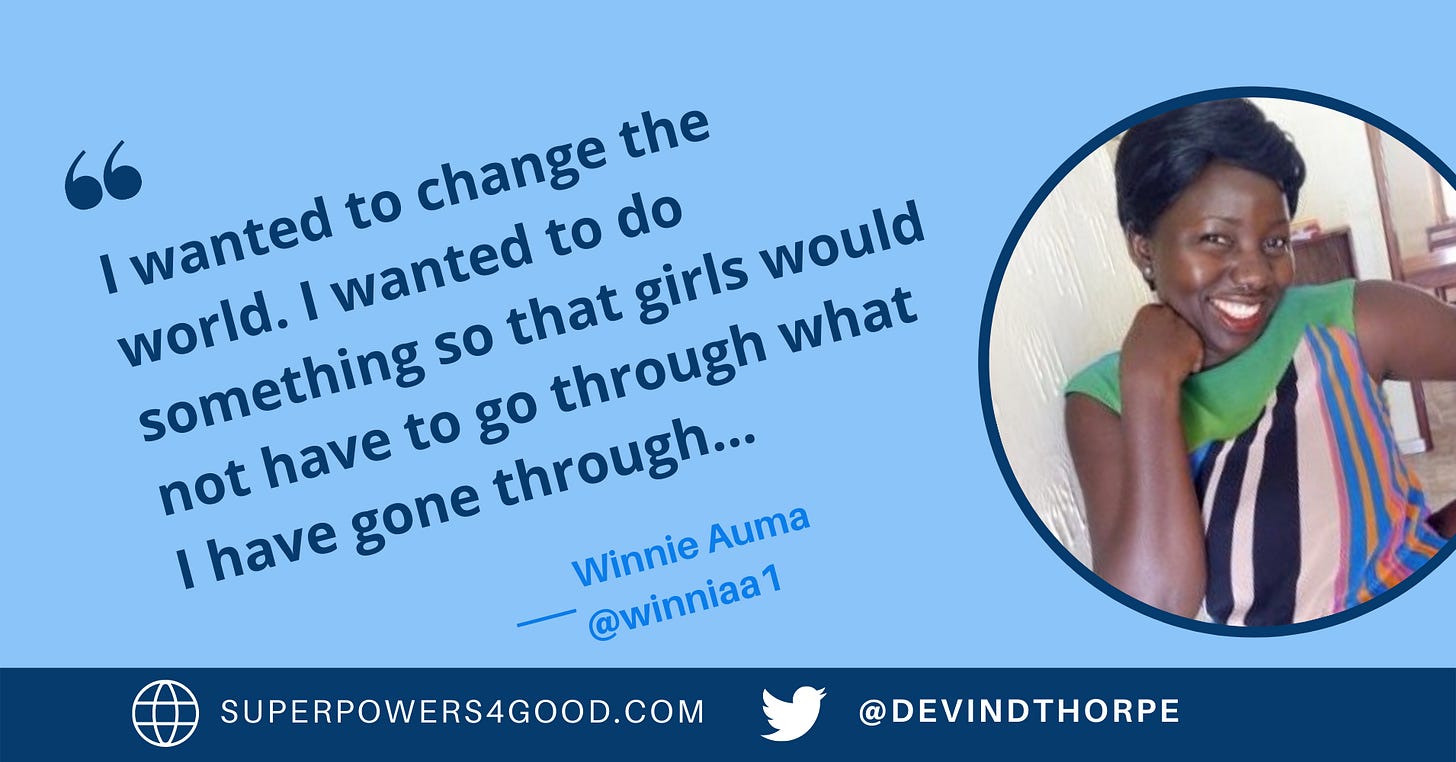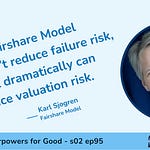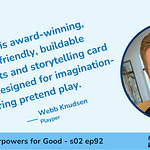For 30 years, Village Enterprise has been working to help people at the bottom of the pyramid lift themselves out of poverty. A randomized control trial begun in 2014 demonstrated that its programs worked. That evidence led to the nonprofit serving as the first recipient of a development impact bond (DIB).
Winnie Babra Auma, vice president of programs for the growing international organization, was raised in poverty and has risen from volunteer to executive leadership, helping to accelerate its growth and impact. She joined me for this inspiring episode.
Village Capital’s Unique Program
Some NGOs find working with the poorest of the poor to be too difficult, leaving them to their own limited resources. Not so with Village Enterprise.
“We use what we call the Poverty Probability Index Survey to ensure that we’re reaching the very bottom of the pyramid,” Winnie says, noting that the nonprofit excludes households earning more than $1.90 per person per day.
She describes four key steps, after the screening, for the Village Enterprise program:
Training. Village Enterprise provides training to people who have never operated a business, helping them learn skills that enable them to earn more money. The program also includes mentoring for the first year after launching a business (see step three below).
Micro-Grants. Rather than make a microloan of $180, the organization makes grants, typically in two rounds. An initial $120 is followed by another $60 if the business is going well. This grant approach allows nervous first-time entrepreneurs to move forward without fearing what happens if they can’t repay a loan.
Business Formation. Three households, having each designated a representative (most often a woman), join together to form a “small business group” and launch a business with their grant money.
Savings Groups. Ten participants form a “savings group” to serve as a small village bank. They collect savings from the members and make loans available to group members when it makes economic sense, creating a small financing mechanism for the businesses.
Given that households at the bottom of the pyramid are severely resource constrained, one goal of the program is to increase spending. To middle-income ears, this sounds wrong. Savings and investments should be the goal, we think. That ignores that the family was going without food, clothing or education. Increasing consumption improves their lives.
Increasing assets, including not only financial assets but productive ones—including better housing—is a second goal.
The randomized control trial that spanned several years beginning in 2014 demonstrated that the program works to achieve these two objectives.
The Development Impact Bond
Because of its success, Village Enterprise was selected as a recipient for the first development impact bond in Africa focused on poverty alleviation.
These financial structures radically change international development finance by putting results squarely at the center of decisions.
Nine lenders funded the bond with a total of $4.32 million, allowing Village Enterprise to implement its program as a service provider. The lenders made the loans with the understanding that they would be repaid only if Village Enterprise reached the required performance targets.
Three “outcome payers” agreed to set money aside to repay the loans if the program reached those performance targets. If Village Enterprise’s program had not achieved the objectives, the intermediary holding the funds would have returned the money to the outcome payers to use for something else—something that does work.
Village Enterprise achieved the targets. See the third-party report verifying it here.
As a result, the outcome payers’ funding went to repay the lenders. The three outcome payers are happy because their money drove the impact they wanted. The nine lenders are happy because they got their money back with interest and can make new loans to do more good. Village Enterprise is happy because they got paid to deliver an effective service.
Most importantly, the people served are happy because they got help that enabled them to increase their consumption and assets.
Winnie provided a summary of the results:
4,766 businesses started
14,100 first-time entrepreneurs trained
95,000 lives impacted
“We were able to increase spending on food, on health, on education by 6.3 percent. We were able to increase assets such as livestock, housing saving and other business supplies within the households by 5.8 percent,” Winnie says. “And to put this in context, this was during the pandemic.”
“Moving towards outcome-based or results-based funding is going to be an important path if we’re really serious about ending extreme poverty,” Winnie adds.
Winnie’s Story
“The work that I do at Village Enterprise is very close to my heart because I have also come from very humble backgrounds,” Winnie says. “I have experienced extreme poverty myself.”
“I have watched my mother make tough decisions. I’ve watched women make tough decisions around what you prioritize. Is it food, education or health?” Winnie says.
She also saw the painful sexism forced on parents who see boys as having greater economic potential. “Sometimes, as a girl growing up, I actually got to be on the other side of life where… a boy child was prioritized over me.”
Looking back, she sees how people and organizations helped her rise. “I’ve been a dreamer,” she says. “And, you know, along the path of my life, I felt like there were helping hands put along my journey.”
One of the big ones was a scholarship from the Carnegie Corporation of New York that funded her college education, qualifying her to become a teacher.
Winnie acknowledges, however, that she didn’t have the patience required of a teacher whose impact may not be visible for a decade or more.
“I wanted to change the world,” she says. “I wanted to do something so that girls would not have to go through what I have gone through, so that mothers would not go have to go through what my mother went through, so that mothers could have options and really meet their needs and provide for their families.”
When Village Enterprise was working in the area where Winnie grew up, she paid close attention, focusing on opportunities to get involved.
When the nonprofit posted a volunteer position, she jumped at the chance, quitting her full-time teaching job.
She has risen from volunteer to country director for Uganda, where she grew the organization and its impact about tenfold, to her current executive role heading programs.
She has seen how using her voice to spread optimism and positivity has become her superpower in this work.
How to Develop Your Voice to Spread Optimism and Positivity As a Superpower
Winnie related a story that illustrated the power of her voice. She visited a small business group where the husband of one of the participating women had taken her grant money, leaving the other participants frustrated and ready to quit.
“We went into this group, we listened, and I started to probe and ask questions,” Winnie says. “And then I got up and shared my personal story.”
“You see, you look at me,” She says. “I am the woman today because my mother made sacrifices. My community members made sacrifices. People in the world, the Carnegie Corporation, gave resources to support me.”
Then she delivered her brand of positivity and optimism:
You are part of the Village Enterprise Program today because there are so many people outside in the world that are believing in you. They want you to invest these resources into a business that generates profits so that you can support your own family. They don't want this money back. The only thing they want from you is that you're using it in ways that are profitable to generate more income that supports you and your entire family.
The speech worked. The man who took the money said, “I had never thought about it that way.”
Winnie says, “I didn’t tell this man what to do. I only use my story and my experience to invite to inspire him to go do good for himself, his wife and his children.”
Winnie says that to be effective in using your voice, you also have to develop empathy and listen as she did to the members of the group.
Empathy is crucial for working among people challenged by poverty, she says, “because poverty is complex.”
If you follow Winnie’s example, you can use your voice to share optimism that can become your superpower, allowing you to do more good.

















Share this post